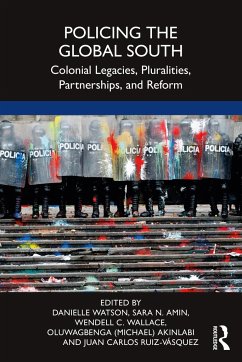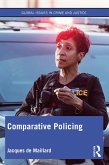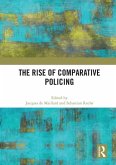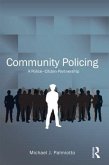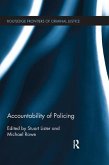Policing the Global South provides scholarship which further transnationalises and democratises ideas about policing practices and philosophies, highlighting renovations in approaches to policing studies, and injecting innovative perspectives into the study of policing from scholars positioned on the 'periphery'.
Criminological knowledge depolarisation underscores a conscious effort by scholars from the Global South to increase intellectual knowledge focused on developing context-specific responses to issues not aligned to Northern ideological positions and specific to the non-Northern context. Such shifts draw attention to the expanse of spaces beyond Northern centres rife with challenges unlike any specific to those experienced or conceptualised by scholars from the Global North with an applied Northern criminological lens. Applying a postcolonial lens to empirical knowledge from country-specific cases in former colonies in Africa, Asia, the Caribbean, the Pacific, and Latin America, this book examines how policing issues not aligned to Northern ideological positions and specific to non-Northern contexts are addressed. The primary purpose is to share innovations in the field of policing - service provision, threats to security, crime responses, justice and international trends - developed in postcolonial developing-country contexts. Given the aim of the book and the contributors' own research on issues of policing across the globe, it discusses themes including but not limited to the colonial legacies and their impact on policing; how plural regulatory systems and partnerships are navigated by the police; the linkages between access to justice, community perceptions, and police legitimacy; innovations and challenges in organisational reform, crime prevention, and community partnerships; and the expanding roles of police organisations in the Global South. While each chapter presents a policing issue in a country within a specific part of the Global South, the book highlights how important it is to frame responses based on contextual realities informed by an awareness of the past and present, with a goal of informing the future.
Delivering a much-needed introduction to those specialising in policing in developing countries, this book is invaluable reading for academics and students of criminology, criminal justice, governance, policy, and IR, as well as professionals in policing organizations across the globe.
Criminological knowledge depolarisation underscores a conscious effort by scholars from the Global South to increase intellectual knowledge focused on developing context-specific responses to issues not aligned to Northern ideological positions and specific to the non-Northern context. Such shifts draw attention to the expanse of spaces beyond Northern centres rife with challenges unlike any specific to those experienced or conceptualised by scholars from the Global North with an applied Northern criminological lens. Applying a postcolonial lens to empirical knowledge from country-specific cases in former colonies in Africa, Asia, the Caribbean, the Pacific, and Latin America, this book examines how policing issues not aligned to Northern ideological positions and specific to non-Northern contexts are addressed. The primary purpose is to share innovations in the field of policing - service provision, threats to security, crime responses, justice and international trends - developed in postcolonial developing-country contexts. Given the aim of the book and the contributors' own research on issues of policing across the globe, it discusses themes including but not limited to the colonial legacies and their impact on policing; how plural regulatory systems and partnerships are navigated by the police; the linkages between access to justice, community perceptions, and police legitimacy; innovations and challenges in organisational reform, crime prevention, and community partnerships; and the expanding roles of police organisations in the Global South. While each chapter presents a policing issue in a country within a specific part of the Global South, the book highlights how important it is to frame responses based on contextual realities informed by an awareness of the past and present, with a goal of informing the future.
Delivering a much-needed introduction to those specialising in policing in developing countries, this book is invaluable reading for academics and students of criminology, criminal justice, governance, policy, and IR, as well as professionals in policing organizations across the globe.
"This is a much needed and well researched addition to the literature on policing focused on how social and political context in the South create spaces and limitations for innovative police reforms. It contributes greatly to our knowledge on police reform implementation in the Global South."
-Hugo Frühling, Professor of Public Affairs, Institute of Public Affairs Universidad de Chile
"We have been exporting conceptual frameworks and operational models to address security and justice problems in Africa, Asia, Latin America, and Oceania. Good-hearted bilateral and multilateral donors have acted like international travelers unaware of the voltage differences across countries, leaving behind a trail of short-circuited reforms. This volume is an antidote to that benevolent naivete. Contributors of this volume have spoken loudly and compellingly to invite us to enter a new era of reforms with perspectives and evidence from the Global South, by the Global South, for the Global South. No serious comparative police scholars can afford missing their voices."
-Hung-En Sung, Professor of Criminal Justice, John Jay College of Criminal Justice
"If you desire knowledge about policing in the Global South, 'Policing the Global South' is the book for you as it provides a wealth of information on policing issues in non-northern contexts. Chapters in this riveting and captivating book are penned by a diverse array of scholars who are not aligned to northern ideological positions. I recommend this book as there is no other book that so succinctly produces knowledge of policing in the Global South as this book does."
-Stephen Williams, former Commissioner of Police, Trinidad and Tobago Police Service.
"With its wide range of research interests in the areas of police history, of colonial history, of gender, policing and security, Policing the Global South, offers scholars of this genre and of postcolonial and transitional societies an invaluable addition on policing. By decentering the Western's notion of itself, this book offers a unique collection of case-studies; ranging from policing in postcolonial South Asia and community policing in Sub -Saharan Africa, to gender and security in East Asia and to the more recent drug misuse and crime prevention in Latin America. In so doing, this book diverts attention away from the master narratives, its associated 'exceptionalism' and reductive reasoning to provide a more compelling argument on 'policing' as an interplay between agency, social order, and politics constituted by and within independent nation states. Focusing explicitly on its own identity and destiny, and reaching towards a new temporality, this collection provides a much needed resource on global policing which will guide and inspire many in the field and beyond."
-Dr Preeti Nijhar is an Independent Scholar, Scholar and author of Community Policing: National and International Models and Approaches (2000) and Law and Imperialism: Criminality and Constitution in Colonial India and Victorian England (Empires in Perspective) (2009).
"This work is an important and necessary reference for scholars interested in developing contextually appropriate responses to policing issues. It advances criminological knowledge on policing in the global South by compiling innovative post-colonial studies by Southern researchers that challenge Northern perspectives, ideologies, and assumptions that have failed to transform policing. The editors consciously included contributions of researchers rooted and situated in different parts of the global South that examine policing issues in their appropriate historical, ideological, and social contexts. As a result, this collection is taking the lead in democratizing and decolonizing policing studies."
-Nathan W. Pino, Professor of Sociology and Honorary Professor of International Studies, Texas State University
"The 21st century is an age of uncertainty and context specific evidence concerning policing in the Global South provides some of the most important theoretical insights. This collection brings together a wealth of data and thoughtful analysis and will be a vital resource for coming to terms with policing and the global system."
-James Sheptycki, Professor of Criminology, York University, Toronto, Canada
"Security represents a public good to which all citizens have - in theory - an inalienable right. However, when it comes to the provision of security 'on the ground', the reality often proves much more complex. In this comprehensive volume of new and emergent research, scholars from across the globe provide fresh opportunities to explore and engage with various aspects of the 'messy' realities of security provision in different contexts. This state-of-the-art book will be a 'must-have' for anyone interested in this field."
-Laura Huey, Professor of Sociology at the University of Western Ontario and Editor, Police Practice and Research.
-Hugo Frühling, Professor of Public Affairs, Institute of Public Affairs Universidad de Chile
"We have been exporting conceptual frameworks and operational models to address security and justice problems in Africa, Asia, Latin America, and Oceania. Good-hearted bilateral and multilateral donors have acted like international travelers unaware of the voltage differences across countries, leaving behind a trail of short-circuited reforms. This volume is an antidote to that benevolent naivete. Contributors of this volume have spoken loudly and compellingly to invite us to enter a new era of reforms with perspectives and evidence from the Global South, by the Global South, for the Global South. No serious comparative police scholars can afford missing their voices."
-Hung-En Sung, Professor of Criminal Justice, John Jay College of Criminal Justice
"If you desire knowledge about policing in the Global South, 'Policing the Global South' is the book for you as it provides a wealth of information on policing issues in non-northern contexts. Chapters in this riveting and captivating book are penned by a diverse array of scholars who are not aligned to northern ideological positions. I recommend this book as there is no other book that so succinctly produces knowledge of policing in the Global South as this book does."
-Stephen Williams, former Commissioner of Police, Trinidad and Tobago Police Service.
"With its wide range of research interests in the areas of police history, of colonial history, of gender, policing and security, Policing the Global South, offers scholars of this genre and of postcolonial and transitional societies an invaluable addition on policing. By decentering the Western's notion of itself, this book offers a unique collection of case-studies; ranging from policing in postcolonial South Asia and community policing in Sub -Saharan Africa, to gender and security in East Asia and to the more recent drug misuse and crime prevention in Latin America. In so doing, this book diverts attention away from the master narratives, its associated 'exceptionalism' and reductive reasoning to provide a more compelling argument on 'policing' as an interplay between agency, social order, and politics constituted by and within independent nation states. Focusing explicitly on its own identity and destiny, and reaching towards a new temporality, this collection provides a much needed resource on global policing which will guide and inspire many in the field and beyond."
-Dr Preeti Nijhar is an Independent Scholar, Scholar and author of Community Policing: National and International Models and Approaches (2000) and Law and Imperialism: Criminality and Constitution in Colonial India and Victorian England (Empires in Perspective) (2009).
"This work is an important and necessary reference for scholars interested in developing contextually appropriate responses to policing issues. It advances criminological knowledge on policing in the global South by compiling innovative post-colonial studies by Southern researchers that challenge Northern perspectives, ideologies, and assumptions that have failed to transform policing. The editors consciously included contributions of researchers rooted and situated in different parts of the global South that examine policing issues in their appropriate historical, ideological, and social contexts. As a result, this collection is taking the lead in democratizing and decolonizing policing studies."
-Nathan W. Pino, Professor of Sociology and Honorary Professor of International Studies, Texas State University
"The 21st century is an age of uncertainty and context specific evidence concerning policing in the Global South provides some of the most important theoretical insights. This collection brings together a wealth of data and thoughtful analysis and will be a vital resource for coming to terms with policing and the global system."
-James Sheptycki, Professor of Criminology, York University, Toronto, Canada
"Security represents a public good to which all citizens have - in theory - an inalienable right. However, when it comes to the provision of security 'on the ground', the reality often proves much more complex. In this comprehensive volume of new and emergent research, scholars from across the globe provide fresh opportunities to explore and engage with various aspects of the 'messy' realities of security provision in different contexts. This state-of-the-art book will be a 'must-have' for anyone interested in this field."
-Laura Huey, Professor of Sociology at the University of Western Ontario and Editor, Police Practice and Research.

